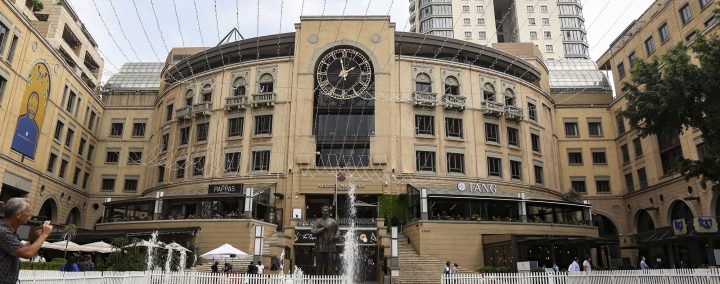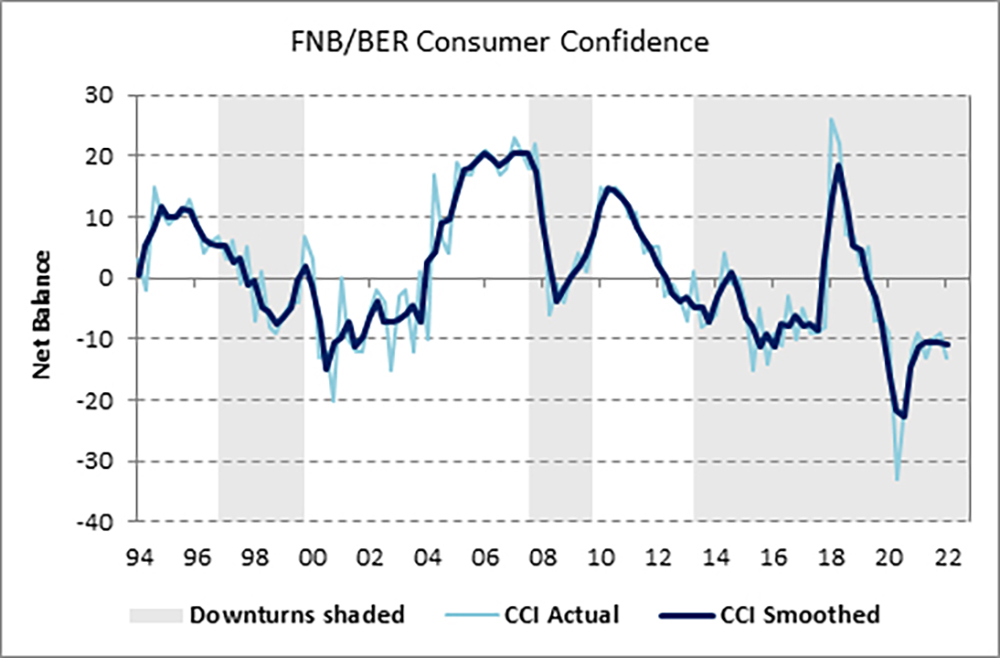FNB/BER INDEX
War in Europe knocks confidence of South Africa’s affluent consumers

FNB’s chief economist attributes the drop in the confidence levels of affluent consumers to ‘the alarming images of Russia’s military invasion of Ukraine, unprecedented sanctions against Russia and the unfolding economic ramifications of this conflict’.
Russia’s military invasion of Ukraine, the unfolding humanitarian crisis and the economic ramifications of the war have shaken consumer confidence levels around the globe. Locally, the FNB/Bureau for Economic Research (BER) Consumer Confidence Index (CCI) declined from -9 to -13 index points during the first quarter of 2022 despite a marked drop in coronavirus infections and a welcome easing of Covid-19 regulations since December.
Domestic consumer sentiment dropped back to -13 index points, the same depressing level last recorded in the second quarter of 2021 when the Social Relief of Distress (SRD) grant was temporarily discontinued, the lethal Delta Covid-19 variant surged and lockdown restrictions were drastically tightened.
Mamello Matikinca-Ngwenya, FNB’s chief economist, points out that the latest reading remains well below the long-run average CCI reading of +2 since 1994, signalling a low willingness to spend (or increased caution) among consumers.
Matikinca-Ngwenya ascribes the slump in consumer confidence to marked (six-point) declines in the economic outlook (from -12 to -18) and household financial positions, with both indices dropping back to levels last seen in 2020.
“While the index measuring the appropriateness of the current time to buy durable goods, such as vehicles, furniture and household appliances, edged up marginally (from -30 to -28), the vast majority of consumers nevertheless still consider the present an inappropriate time to buy expensive durable goods,” she says.
Diving deeper into the FNB/BER CCI reveals that different household income groups seem to be experiencing varying confidence levels. For example, high-income households (earning more than R20,000 per month) declined sharply from -11 to -18 index points, while middle-income households (earning between R2,500 and R20,000 per month) sagged slightly from -9 to -11 index points. Conversely, low-income (consumers earning less than R2,500 per month) displayed an extended recovery from -9 to -6.
“Although consumer sentiment remains downbeat across all three income groups, affluent consumers are now considerably more pessimistic about the outlook for the economy and their household finances compared with low-income households,” she says.
Matikinca-Ngwenya attributes the marked decline in the confidence levels of affluent consumers to “the alarming images of Russia’s military invasion of Ukraine, unprecedented sanctions against Russia and the unfolding economic ramifications of this conflict. Soaring fuel prices and another 25 basis point hike in the prime interest rate during the first quarter may also have started to squeeze the spending power of high- and middle-income consumers.”
Skyrocketing international oil prices have already seen the domestic prices of petrol, diesel and paraffin shoot up by about R2 per litre since January, and further massive price hikes are on the cards for April. On top of this, soaring global wheat prices are likely to spill over into higher food inflation, while economists expect another interest rate hike at the end of March – all of which will further increase the cost of living in South Africa.
Matikinca-Ngwenya cautions that even though low-income confidence remains seemingly impervious to the economic toll of the war during the first quarter, less affluent households will eventually be the hardest hit by spiralling fuel and food prices, as these categories make up a proportionally larger share of their household budgets compared with those of wealthy consumers.
She says the extension of the monthly R350 SRD grant for another year to the end of March 2023 is likely to have underpinned the confidence levels of low-income consumers.
“Discretionary spending will come under strain as the prices of necessities such as food and fuel scale new record highs and interest rates continue to edge up, calling for downward revisions to real consumer spending projections for 2022,” Matikinca-Ngwenya warns. BM/DM





















 Become an Insider
Become an Insider
Comments - Please login in order to comment.